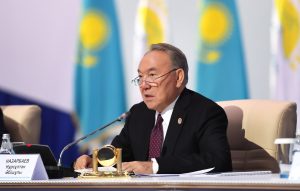Kazakhstan’s parliament could soon strike out the law “On the First President,” which would severely impact the immunity granted thus far to former President Nursultan Nazarbayev and his family.
On December 28, the parliament considered a bill with a strange formula: “A draft law on the constitutional law On the First President losing force.” Due to procedural issues, however, the parliament could not vote to strike the law out.
“A joint meeting of both chambers will be convened in January and we will discuss these changes,” Yerlan Koshanov, speaker of the lower chamber, told the media.
A document leaked to journalist Vadim Boreiko on December 26 foreshadowed the willingness to remove the law. In the leaked letter, three deputies — Yerlan Sairov, Aidos Sarym, and Zhanarbek Asimzhanov — proposed canceling the law, which gives a range of privileges to Nazarbayev and his relatives.
The three deputies confirmed the veracity of the document when reached by Vlast.kz journalists on the same day.
“Two months ago I said that this issue would be resolved by the end of the year. For a while now the parliament has been dealing with this,” Sairov told Vlast.kz.
According to the Constitution (Article 46), Nazarbayev retains a range of immunities from criminal prosecution, but the proposed law will ultimately impact the immunity also granted to his family members and the budget that the government allocates to expenses related to the maintenance of his “First President” organization. The provisions of the law included housing, transport, a museum, a personal archive, a personal library, and medical assistance.
The law “On the First President,” adopted in July 2000, established a wide array of privileges for Nazarbayev. The law was amended in 2010, when Nazarbayev was given the title of “Elbasy – Leader of the Nation.”
According to the law, the First President maintained a consultative and strategic role even after his retirement in 2019.
When he retired, he retained and exercised this power. Experts argued that the first years of Kassym-Jomart Tokayev’s presidency were a constant balance between Akorda, the presidential palace, and the Library, which symbolized Nazarbayev’s headquarters.
In May 2021, a mural appeared in Almaty depicting a young Nazarbayev, later modified with the word “Cancel” on his forehead. The #CancelElbasy hashtag made the rounds of social media at the time.
Just weeks later, coinciding with his birthday in July, Nazarbayev witnessed the erection of two more statues in his honor, one in the capital and one in Shymkent.
The events of January 2022, which became known as Qandy Qantar (“Bloody January”) further weakened the position of Nazarbayev, who appeared frail and loyal to Tokayev’s “New Kazakhstan” in a video released in the aftermath of the violence. That same day, a popular petition to scrap his immunity gathered tens of thousands of signatures.
After Qandy Qantar, Nazarbayev was no longer in charge of the National Security Council, no longer the chief of the Nur-Otan ruling party (soon after renamed “Amanat”), and his position as Elbasy looked increasingly shaky.
In the June 5 referendum, Kazakhstan voted in a yes-or-no package of constitutional reforms during a referendum that Tokayev called essentially to show the people that he meant to move on from the Nazarbayev system. In the reform package, one provision intended to weaken the powers associated with the title of Elbasy, essentially an anti-Nazarbayev move given that there is only one “Father of the Nation.”
Throughout his three decades in power, Nazarbayev, who often loudly rejected the cult of personality, had nevertheless indulged in his ability to shape Kazakhstan in his own image.
A celebratory banknote was issued in November 2016 with Nazarbayev’s face on it. Astana’s airport was renamed in honor of the president in June 2017. The central Furmanov Avenue in Almaty was renamed Nazarbayev Avenue in November 2017. And, ultimately, the capital was renamed Nur-Sultan the day after Tokayev took office in 2019, leading several mayors to rename various central avenues in their cities after the First President.
At every single one of these steps, Nazarbayev said he did not ask for it, that he was instead focused on the well-being of the country.
With the reversal of the political currents, however, the castle of Elbasy privileges might be under siege.
The renaming of Nur-Sultan back to Astana in September was another step toward demolishing the symbols of Nazarbayev’s omnipotence. Granted, the capital will continue to be imbued with his influence, given his hand in the city’s 25-year-long evolution, with buildings he designed, and with landmarks bearing his name.
The lag between the landslide approval of reforms proposed in the June referendum and the scrapping of the law “On the First President” is a telling tale of the resistance to doing away with the old president while he is still alive.
In 2019, in these pages, I wrote that “Elbasy will continue to be the guarantor of unity until his final hours.” The sunset of the autocrat could now be nearer, but whether Tokayev’s represents a genuinely “new system” is still unclear.

































